Record Store Day Jazz Release Preview Special
all actually played
This year's RSD offerings are among the best ever, especially in the jazz category. This is by no means "complete" coverage of what's available. For instance, there's a four LP Sonny Rollins set Freedom Weaver: The 1959 European Tour Recordings from Resonance that looks really interesting but that one didn't show up. The Record Store Day website has a full listing of what's going to be available. (Following posting this story the Sonny Rollins set did show up, so will cover that separately.)
I received copies of the titles pictured above and spent some pleasurable time listening to all of them at least once and some more than once. Malachi Lui listed some of them in his February 16th Record Store Day list coverage of all musical genres but of course at that time no promotional copies were available, so here we go with some of the auditioned RSD 2024 jazz titles. Let me add this: these were sealed not hand selected copies and without exception they were the most perfectly pressed pile of records I've come across in quite some time. All were flat, concentric, quiet and beautiful to look at too.
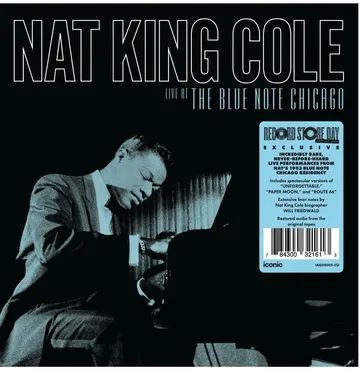 Nat King Cole Live at the Blue Note Chicago
Nat King Cole Live at the Blue Note Chicago
Iconic IAG00005LP 2 180g LPs pressed at RTI (limited to 4000 copies)
Music: 9
Sound: 8 (for what it is!)
Let's start with the best packaged set, the only one presented in a deluxe laminated "tip on" gatefold jacket—not that the package is key. It just happens to be a beaut and the full-sized folded triple page insert containing Will Friedwald's annotation and some stunning Nat pictures is memorable. Open it up and you're staring at a full page photo of Nat with Jackie Robinson at Wrigley Field June, 18th,1954 a year after these performances were recorded at Frank Holzfeind's small Blue Note on West Madison Street for a full week beginning August 28th, 1953 at a time when Cole was mostly playing theaters, concert halls, and only the top clubs on the coasts.
The twenty seven tracks here were culled from ten hours and almost two hundred takes recorded on the club owner's Webcor monophonic recorder running at 7 1/2 IPS. These were not professional recordings but they were good enough for the mastering engineers to select these and turn them into good, serviceable recordings that take you to the club.
Cole sings among other songs, "Unforgettable", "It's Only a Paper Moon", "Sweet Lorraine", "Mona Lisa"/"Too Young" (recent hits for him), "Nature Boy" and "Route 66".
There's something about Nat "King" Cole's voice that makes 50s era recording technology seem wholly appropriate. Perhaps it's his smooth, velvety midrange that gets so well-captured by the tech of that time. Guitarist John Collins and bassist Charlie Harris accompany him and both remained with Cole for the duration of his career. Drummer Lee Young joined in 1951 and stayed on until 1962.
Friedwald writes that these 1953 recordings are "...the most extensive document we have of Cole's playing in a small group with a drummer." The author of "Straighten Up and Fly Right: The Life and Music of Nat King Cole" provides a great deal for the casual listener to pay attention to in the playing and singing and concludes by writing "There's something miraculous on virtually every track here". I only wish that I had been able to hear this music when I was writing my biography...." That's a very strong endorsement. I second it.
 Art Tatum: Jewels in the Treasure Box-The 1953 Chicago Blue Note Jazz Club Recordings
Art Tatum: Jewels in the Treasure Box-The 1953 Chicago Blue Note Jazz Club Recordings
Resonance HLP-9064 3 180g LPs pressed at QRP (limited to 2000 copies)
Music: 9
Sound: 9 (for what it is!)
The pianist's pianist, the Jimi Hendrix of the piano, whatever you want to call him, here are thirty nine unheard live performances of Tatum with his trio featuring guitarist Everett Barksdale and bassist Slam Stewart also recorded live at Chicago's Blue Note, August of 1953 and this one, restored, mastered and cut by Matthew Lutthans on the TML-M lathe, sounds even more remarkably "right" than the Cole recording, which is plenty good. There's greater instrumental clarity and more space between the players.
The piano's transient clarity and timbral "rightness" is remarkable and Barksdale and Stewart are also well-captured, especially Stewart's arco-bass, which will startle and amaze you from the first time he drags the bow across the strings. Tatum sounds like a player piano set to the fastest its mechanical fingers can go but of course this is flesh and blood playing glissandos that will make your head spin and repeatedly unleash adrenalin. The Barksdale/Tatum interplay is another musical and sonic treat.
Another great full sized booklet enclosed within a spectacularly laid out triple gatefold jacket with scholarly Tatum annotation by Professor Brent Hayes Edwards and tributes from Sonny Rollins, Ahmad Jamal, Terry Gibbs and others. I listened straight through to all six sides twice! Another one that's highly recommended!
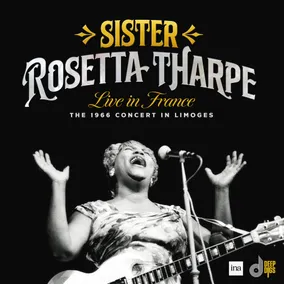 Sister Rosetta Tharpe Live In France-The 1966 Concert in Limoges
Sister Rosetta Tharpe Live In France-The 1966 Concert in Limoges
Deep Digs/Elemental Music DD-002 2 180g monophonic LPs pressed at a GZ Media affiliate (limited to 2200 copies)
Music: 10
Sound: 9
Sister Rosetta Tharpe, custom triple pickup Gibson SG in hand wows a French audience November 11th, 1966 with her finger picking good playing and rousing Gospel vocals. She was, as annotator Susan Tedeschi explains, "...doing the windmill which she probably was before Pete Townsend was even born" and you'll hear echoes of Eric Clapton, or rather echoes of her in Eric Clapton and any large number of rockers. Though she didn't play no rock'n'roll, she rocked before it was recognized as such, but the sound she got from her pedal and effects-free playing was sweet, warm and bluesy. She sang pure gospel in songs like "This Train", "Jesus Met the Woman at the Well", "Give Me That Old Time Religion" and the "must haves" "Down By the Riverside," "When the Saints Go Marching In" and "Joshua Fought the Battle of Jericho".
Most notable is the certainty with which she sings and plays every note. It's just her and her guitar onstage and she fills it, adding humor, joy and a rousing joie de vie throughout. She was a force of nature. Henry Rollins says in the annotation, "I have a lot of records that could be considered religious but a lot of them are by Slayer, so I'm not one to gofer a Gospel playlist, but because of Sister Rosetta and the music of Mahalia Jackson, I ended up getting a lot of Gospel-oriented record and while religion isn't a part of my life, I don't think that necessarily hinders one from enjoying this kind of music." I'll add an amen to that.
Another Zev Feldman discovery while digging in 2017 through the INA (National Institute of Audio/Visuals) France archives. It was recorded by ORTF (French Office of Radio and Television) and so the mono sound quality is quite good, though it apparently went through various digital restoration hands—there are two sets of such credits the main one crediting Michael Graves at Crisis Studios, Los Angeles.
You'll definitely enjoy a play or three of this concert but whether or not you'll play it often is something to consider before buying. What you could do is enjoy and then pass it on to someone else. That would be the Christian thing to do, not that I'm an expert there.
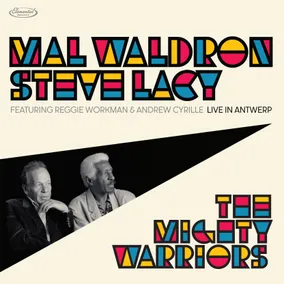 Mal Waldron/Steve Lacy The Mighty Warriors: Live in Antwerp
Mal Waldron/Steve Lacy The Mighty Warriors: Live in Antwerp
Elemental Music 5990546 2 180g stereo LPs pressed at a GZ affiliate (limited to 1500 copies)
Music: 10
Sound: 10
This September, 1995 concert at the De Siegel theater in Antwerp, Belgium pairs pianist Waldron with soprano saxophonist Lacy. The two first played together at New York's 5 Spot in 1958. They are joined by Waldron's trio mates, bassist Reggie Workman and drummer Andrew Cyrille, neither of whom are in need of introduction. None of them do, actually but just in case.
This was the last of three concerts honoring Waldron on his 70th birthday. Jazz writer Adam Shatz notes in his annotation that both Waldron and Lacy shared an affinity for Thelonious Monk. The quartet performs satisfyingly mischievous/Monkish takes on "Epistrophy" and "Monk's Dream", but opens with a slinky Waldron original, "What it is", which sets the mood. "Monk's" Dream" follows "Longing", a Lacy original that does its own serious tuneful slinking. The second disc features a Workman original on one side and a pair of Waldron originals, "Snake Out" and "Variations on a Theme By Cecil Taylor". Everyone is in top form—if you don't know Lacy's sound, you'll be a convert and start seeking out his records. Easy to listen to but definitely not "easy listening."
Waldron's widow Hiromi helped arrange for this concert's release and she contributes some notes as well, as do Cyrille and Workman. Also contributing are Dave Liebman who relates a very funny first meeting with Lacy and playing together at a Florence, Italy gig, and pianist Vijay Iyer, who of course devotes his space to Waldron. All of the annotation is fascinating and useful in gaining a better understanding of how these two very different personalities worked together.
Patrick Wilen, son of saxophonist Barney Wilen was in possession of the tapes did the initial tape transfer, with mixing and sound restoration b Marc Doutrepont (eQuus). Matthew Lutthans did the LP mastering on The Mastering Labs lathe in Salina, Kansas.
This is by the far the best sounding of the releases covered in this article and musically it's probably my favorite too. The stage picture is vibrant, dynamic and convincing, Instrumental timbres are accurate—especially Lacy's soprano sax and Cyrille's drum kit, which has been superbly mic'd, and overall dynamics are great. You're at the foot of the stage. Highly recommended
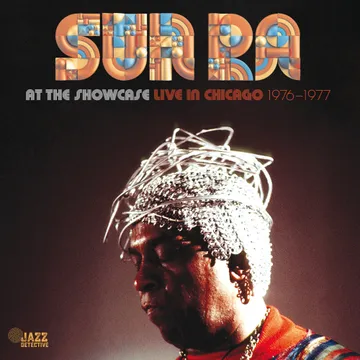 Sun Ra At The Showcase Live In Chicago 1976-77
Sun Ra At The Showcase Live In Chicago 1976-77
Jazz Detective DDJD-014 2 180g stereo LPs pressed at a GZ affiliate (limited to 3000 copies)
Music: 8
Sound: 9
"Why don't you go to the ASPCA? You'll hear the same noises and it's free!" What my mother loved to say to me when she heard Coltrane wafted outside my bedroom when I was home from college. I wasn't into Sun Ra at that point but I can only imagine what she'd say listening to Sun Ra's music. This is a keyboard rich, funky set, I imagine Prince would have dug listening to Sun Ra on piano and electronic keyboards. Ray Manzarek too. Try "Synthesis Approach", track three, side one.
There's a big ensemble playing Joe Segal's Jazz Showcase in Chicago—eighteen in all. Sides one and two were recorded November 4th and 10th, 1977; sides C and D February 21, 1976. To save time here's the blurb on the RSD website: "Contains previously unreleased live recordings of the legendary intergalactic composer/pianist Sun Ra captured live at Joe Segal's Jazz Showcase in Chicago. This is an official release on producer Zev Feldman's Jazz Detective record label, in partnership with Elemental Music, and in cooperation with the Sun Ra Trust. Researched and compiled by longtime Sun Ra archivist Michael D. Anderson, and transferred from the original tape reels, this limited-edition 180-gram 2-LP set includes an extensive insert with rare photographs; liner notes by GRAMMY-winning author and historian Ashley Kahn; and interviews and statements from a who's who of music icons."
Would this be a good way "in" to Sun Ra? I'd say "yes!" because not only is the music accessible cacophony and fun and the spacious stereo sound very "life like", if a bit bright (but not harsh). It's sourced from 7 1/2IPS Memorex tape and was digitally transferred (of necessity) and cleaned up. Matthew Lutthans cut lacquers, this time at Kevin Gray's Cohearent Audio (the secret's out: they often work together).
And, the annotation opens to you the world of Sun Ra, with contributions by Reggie Workman, Jack DeJohnette, David Murray and many others who performed with him including saxophonist Marshall Allen, who today at 99 leads the band! All present fascinating pictures of this gifted, high energy creative force. The project was coordinated by Irwin Chusid, who saw (and maybe still sees) after the Raymond Scott estate's music, and I think I recall being related to him. Highly recommended (oops, I said it again).
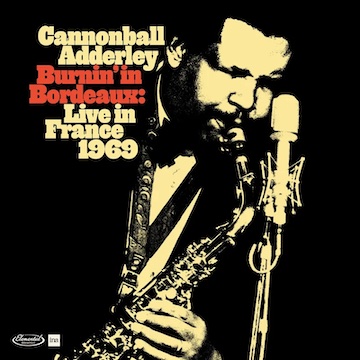 Cannonball Adderley Burnin' in Bordeaux Live in France 1969
Cannonball Adderley Burnin' in Bordeaux Live in France 1969
Elemental Music 5990548 2 180 LPs mono pressed at a GZ affiliate
Music: 7
Sound: 6 (mono)
The early live Cannonball Riverside records were always fun to listen to both for the music and for his playful, so cool between tune call outs. I used to walk around college campus muttering "'Sack o' Woe' ladies and gentlemen, 'Sack o' Woe'" doing my best cool Cannonball impression. It got me feeling so "soulful". He was a great player, bandleader and educator on and off the stage. This set was recorded March 14th, 1969 at the Alhambra Theater. After almost a decade as keyboardist and composer, less than a year later Joe Zawinul exited Adderley's group to form Weather Report. This was a great band with brother Nat on cornet, and Victor Gaskin on bass (his extended arco solo on "Manha De Carnaval" is a standout) and Roy McCurdy on drum making this heavy on the rhythmic punch and less bluesy than older Cannonball records. Even Nat and Oscar Brown's "Work Song" has a harder edge than usual but these were turbulent times and these arrangements reflect that. There's a take on Zawinul's "Mercy, Mercy, Mercy", Adderley's greatest "hit".
This is the first official release of this material sourced from the original ORTF tapes and the sound is "good mono radio" sound, mastered again by Matthew Lutthans on the TML lathe. No doubt this often bootlegged material has never sounded better but it's not a sonic standout. "Burnin'" is a good description for how the band plays and how many of the arrangements were crafted. There's an edge to it.
The annotation is outstanding and everyone including Bob Blumenthal, who I used to run into occasionally in Boston, is lauditory, but this one was among my least favorites but that doesn't mean you won't like it more. To me it sounds like Cannonball pushing boundaries to get where music was going rather than to where he wanted to take it.
"We are now going to play a piece by Leonard Bernstein, who is a musician in New York who leads a big band..." was my favorite Cannonball lead in on this set in which he doesn't sound particularly happy and the ballad takes on an oddly hard edge, though the next tune, a cover of "Why Am I Treated So Bad", with Zawinul on electric piano, brings some delicious simmering funk, laced with proper bitterness.
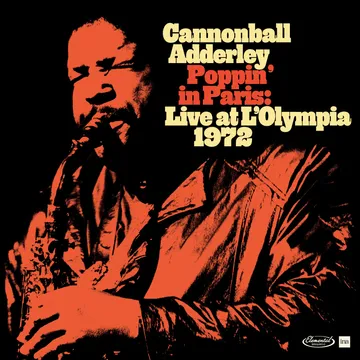 Cannonball Adderley Poppin' in Paris: Live at L'Olympia 1972
Cannonball Adderley Poppin' in Paris: Live at L'Olympia 1972
Elemental 5999059 2 stereo 180g LPs pressed at a GZ affiliate.
Music: 8
Sound: 8
Within a few bars of the twenty minute opener, George Duke's "Black Messiah" the difference in the Adderley band's vibe is obvious. Duke on electric piano brought a slow simmering "In A Silent Way" mystery to the group and Adderley gives him plenty of room to work it, but more than that it sounds as if the somewhat uncomfortable strained stylistic transition evident in the Bordeaux recording had been resolved and all, especially Adderley, had accepted it and on the opener his lines are bold, clear and new. Same with what brother Nat brought to the opening tune. This sounds comfortable and "modern" for that time.
McCurdy is more into the groove and pounds less. The "Autumn Leaves" take on side two begins as a ballad but quickly gets to be-bop. Both Adderleys sounds liberated by the McCurdy/Walter Booker rhythm section as the group unwinds into new territory that probably alienated some of the "old school" fans while attractive a new, younger set.
Sadly Cannonball was felled by a stroke two years later and was gone at age 46. He didn't look great in the photos accompanying this set. He'd clearly put on too much weight. What a shame.
The stereo sound is a huge step forward as well compared to the Bordeaux recording: wide, deep and transparent. Again Matthew Lutthans mastered from supplied files and cut on the TML lathe. The booklet's annotation, including a 1983 remembrance from brother Nat is again, as expected from Zev Feldman, outstanding and well worth reading.
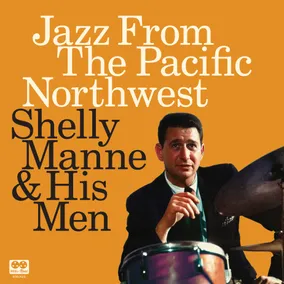 Jazz From The Pacific Northwest Shelly Manne & His Men
Jazz From The Pacific Northwest Shelly Manne & His Men
Reel to Real RTRLP012 1 180g stereo, 1 180g mono LPs, unknown pressing plant (limited to 1500 copies)
Music: 9
Sound: 8
"Jazz from The Pacific Northwest combines two previously unissued concert recordings from one of the greatest jazz drummers of all-time, Shelly Manne. The first recording, recorded at the Monterey Jazz Festival on October 4, 1958, features Monty Budwig on bass, Russ Freeman on piano, Stu Williamson on trumpet, and Herb Geller on flute and alto saxophone. The second recording features Hampton Hawes on piano, Frank Strozier on flute and alto saxophone, Conte Condoli on trumpet and guest vocalist Ruth Price on two tracks recorded at the Penthouse jazz club in Seattle on September 7 and 15, 1966" —RSD site blurb.
Transferred to digital from the original 7 1/2 IPS tapes and "cleaned up". Lacquers cut by Matthew Lutthans at Cohearent Audio (the album credits say Kevin Gray but the lead out groove inscription says ML.
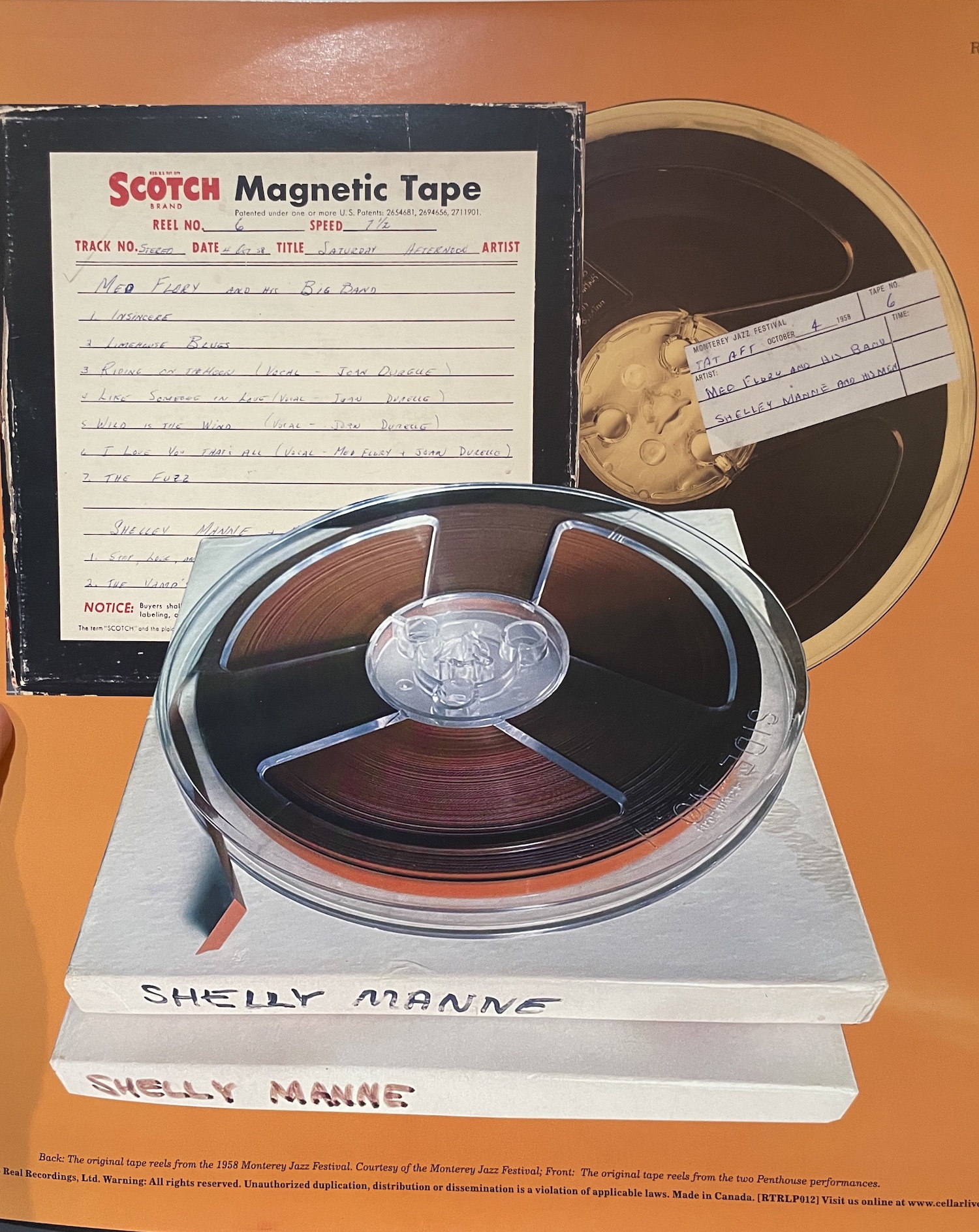
Whatever is supposed to be the cool "west coast sound" this isn't it—at least on side one. The Monterey Jazz Festival set swings heavily especially the take on Charlie Mariano's "The Vamp's Blues". Side two's "Quartet (Suite in Four Movements)" a seventeen minute Bill Holman composition is a bluesy, Duke Ellington-like composition heavy on Stu Williamson's trumpet and Herb Geller's soulful sax, and of course Manne is mic'd up well and gets in some great rumbles and cymbal sizzles in his extended drum solo.The first disc's stereo sound exudes "outdoorsness" but there's no stage monitors to muck up the sound, which is very good.
Disc two is a closely mic'd monophonic recording that's outstanding. Manne and Budwig anchor Hampton Hawes on piano, Frank Strozier on flute and alto sax and big bander trumpeter Conte Candoli (Woody Herman/Stan Kenton) who was a Tonight Show band regular brings a different horn sound to this group. Strozier does "Summertime" on flute, which of course Herbie Mann knocked out of the park on his classic 1961 Village Gate record. Strozier's take is a bit harder edged, but equally fine and Candoli does a turn on muted trumpet not sounding like Miles. Hawes and Budwig get solo time as well.
The Reel to Real label may be new (at least it is to me) and different but it's again Zev Feldman's doing and so the liner notes and photos in the full sized booklet are the best. Great Manne remembrances from Holman, Joe LaBarbera, Peter Erskine and others. You'll come away knowing a great more than you did going in, while listening to toe tappingly great playing. Nicely pressed at unknown pressing plant. Recommended.
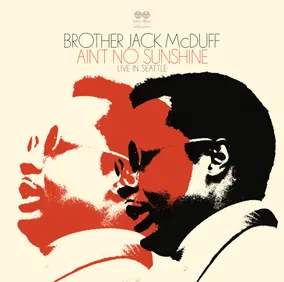 Brother Jack McDuff Ain't No Sunshine Live in Seattle
Brother Jack McDuff Ain't No Sunshine Live in Seattle
Reel to Reel RTLP011 2 180g stereo LPs (limited to 1500 copies)
Music: 8
Sound: 7
B3 fans will eat this up. So soulful, with horns spread full left and right, some wah wah pedal added to the mix or straight forward hollow bodied picking from Vinnie Corrao. This is so much fun and McDuff's playing is so juicy and occasionally downright unusual. Recorded at The Gallery, Seattle, September 13, 1972. Everything's closely mic'd because there was probably little room to do it otherwise and it makes for an intimate 'you are there in the small space right by the stage' experience.
RSD blurb: "A marvelous bandleader and organist as well as capable arranger, “Brother” Jack McDuff has one of the funkiest, most soulful styles of all time on the Hammond B-3. His rock-solid basslines and blues-drenched solos are balanced by clever, almost pianistic melodies and interesting progressions and phrases. McDuff began as a bassist playing with Denny Zeitlin and Joe Farrell. He studied privately in Cincinnati and worked with Johnny Griffin in Chicago. He taught himself organ and piano in the mid-’50s, and began gaining attention working with Willis Jackson in the late '50s and early ’60s, cutting high caliber soul-jazz dates for Prestige."
Organist Brian Charette in the booklet's notes puts it well: "I love Captain Jack's sound in the '70s: strange funky arrangements, plinky muted organ stops and a gang of horns going for it. McDuff is actually my favorite among the classic cats, and I'm so proud to say that I learned to play organ on his old B3 in Harlem at Showman's!..."
The stereo sound is great, the top end is bit stifled but the midrange is great and that's where the organ lives. Gotta love the McDuff original titles: "Theme From Electric Surfboard", "The Jolly Black Giant" and "Middle Class Folk Song". The "Ain't No Sunshine" cover...shines. Speaking of which, I'm taking a break now to (safely) watch the eclipse.
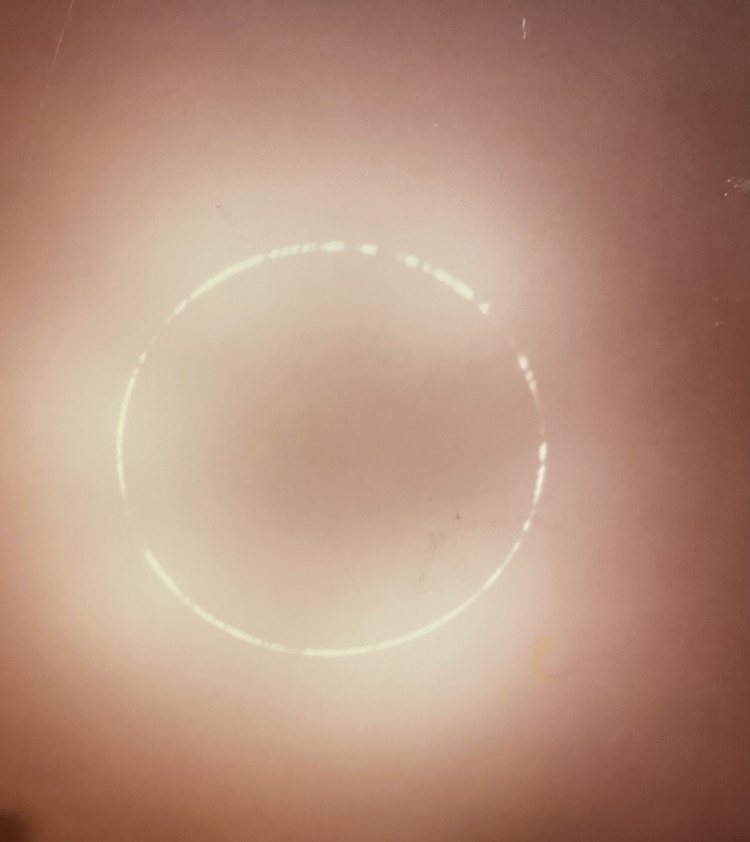
Photo by Wendy Carlos Porto Gentil, Gabon 3/29/1987
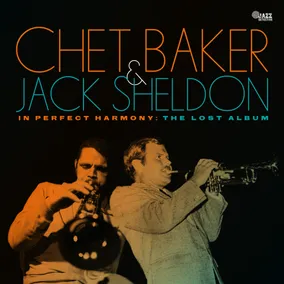 Chet Baker & Jack Sheldon In Perfect Harmony The Lost Album
Chet Baker & Jack Sheldon In Perfect Harmony The Lost Album
Jazz Detective DDJD-015 AAA 180g LP pressed at a GZ affiliate (limited to 1500 copies)
Music: 9
Sound: 9
At this point you could populate much of an entire record shelf with newly discovered and released Chet Baker albums and no doubt fans have. This is the only record in this survey that was cut AAA directly from the analog master tape (by Matthew Lutthans on the TML lathe). Can you hear the difference? Yes you can, as good as some of the others are and though this is from a 7 1/2 inch copy that might not have been a finished mix. There's something direct and right there about this one.
Chet and Jack were both trumpet players but of course very different in tone and temperament. And even though Baker had yet to fully recover and be again on his way toward performing and recording in full creative flower, he was good enough and the contrast between the two is remarkable and entertaining. Kind of like Louie Prima (Sheldon) and Keely Smith (Baker).
If you're unfamiliar with Jack Sheldon, Google him and you'll realize you probably are, but just didn't know it from the name. Sheldon is gruff—often funny and mischievous in his delivery—and the perfect vocal and brass foil for Baker. Even if you have a shelf of Baker, you should consider adding this one. The shelf full means you're already a fan, so why not? Good sound, tight arrangements and playing and the back story here perfectly befits the Jazz Detective label.
This was Chet's first recording session since his teeth-knocked-out-fight in 1966 (here fitted with dentures) and he was hesitant but did it anyway for his pal Jack Sheldon and the producer/arranger Jack Marshall, who among other credits, wrote the arrangement for Peggy Lee's "Fever" cover featuring Joe Mondragon on bass and Shelly Manne on drums with guitar great Howard Roberts adding the finger snaps.
The back story here, the smaller Tustin studio and Baker's life situation at the time are reminiscent of Johnny Hartman's Once In Every Life recorded 1980 late in Hartman's career at Ben Rizzi's small suburban Long Island studio. This recording is quite fine marred only by the direct bass patch, which gets obtrusive over time. At least Mondragon's lines are eminently listenable!
Here's the RSD blurb:
"In Perfect Harmony: The Lost Album is a previously unreleased studio album from West Coast trumpet icons Chet Baker and Jack Sheldon. Recorded in Tustin, California, in 1972 with pianist David Frishberg, bassist Joe Mondragon, drummer Nick Ceroli and guitarist Jack Marshall. Produced by Jack Marshall and Hank Quinn, the tape comes from the personal archives of Jack Marshall’s son, the legendary film producer Frank Marshall. This official release for Record Store Day is co-produced by Zev Feldman and Frank Marshall for Feldman's Jazz Detective label (via Elemental Music). The all-analog recording is mastered by Matthew Lutthans at the Mastering Lab directly from the original master tape reel and manufactufactured at Memphis Record Pressing. The limited-edition 180-gram LP edition includes an extensive insert with rare photographs, newly commissioned liner notes, plus interviews and testimonials from musicians who were inspired by and knew and played with Chet Baker and Jack Sheldon." Some tracks sound good enough to be on a hi-fi show demo list and should please even the least adventurous attendee).
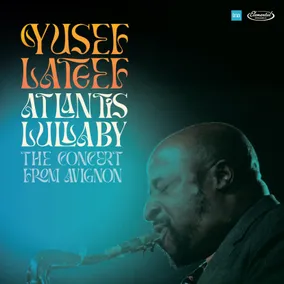 Yusef Lateef Atlantis Lullaby The Concert From Avignon
Yusef Lateef Atlantis Lullaby The Concert From Avignon
Elemental 59990545 2 180g stereo LPs pressed at GZ affiliate (limited to 1500) t
Music: 7
Sound: 7
Drummer Albert "Tootie" Heath, who passed away April 3rd at age eighty eight plays on this record along with Kenny Barron and bassist Bob Cunningham who recorded four Atlantic studio albums with Lateef. Heath contributes annotation here excerpted from an October, 2023 interview with Zev Feldman. Of Lateef Heath said, "I never saw another person like that, not yet in my life, and I'm 88 years old." Heath was talking about the man's kindness and gentleness, not about his musicianship, though he was equally complementary.
Sonny Rollins, also interviewed in 2023 for this set said "I'm ninety three yearly old and still trying to be a person like Yusef." All the tributes paid in the other interviews express similar sentiments, all of which can be heard in Lateef's music. "A Flower", the piano/flute duet that concludes side one expresses through music what the musicians put into words. Quite a beautiful cosmic statement that never descends into sentimentality.
All of the interviewees provide tributes more than mere recollections. Kenny Barron thanks Lateef for encouraging him to return to school, which he did, getting a BA. But of course all of them, including Reggie Workman, James Carter and Joe Lovano mostly pay musical respects in addition to commenting on what a fine human being he was.
"Yusef's Mood" is an old-fashioned blues workout not exactly in Barron's "wheelhouse" but they plow through and have fun with it. Same with "Eboness", another bluesy number a la Herbie Hancock's "Watermelon Man". Cunningham's arco bass solo is a highlight and Lateef's cover of I'm Getting Sentimental Over You" hits the spot.
However, between two less than compelling bluesy "workouts" that take up a half hour's worth of time here, and it's an unsatisfactory and unbalanced mix, this for me was the least interesting of this bunch. Though those attending the live show had a great time, made obvious by the best audience recording and mix of all of these records.


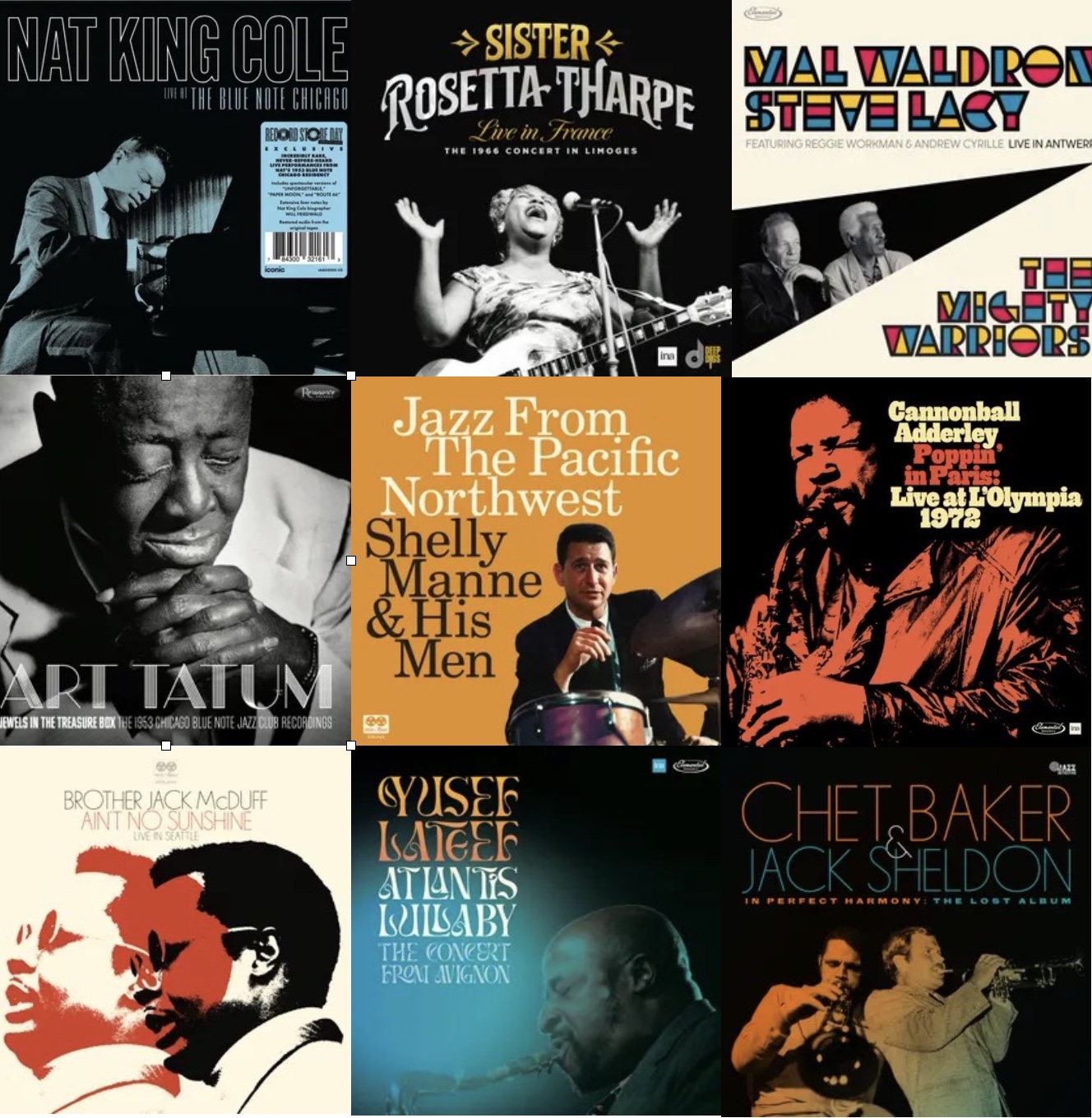
















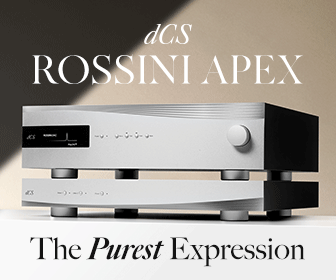




















.png)








